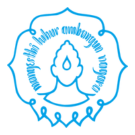Social Capital Role on Pregnant Woman Health in Klaten, Central Java
Abstract
Background: Maternal class, partnership with traditional birth attendant (TBA), and maternity waiting home are health community empowerment programs in North Klaten Subdistrict, Central Java, seem to be partial, even though they involve the same parties and the same goal to improve the health of pregnant women. The purpose of this study was to explore social capital role on pregnant woman health in Klaten, Central Java.
Subjects and Method: This was a qualitative study with a case study design in North Klaten Sub-district, Klaten, Central Java. The data were collected by in-depth interview, observation, and document review.
Results: This study shows that in order for a pregnancy health program to run effectively it requires the integration of information on the health of pregnant women and the development of pregnancy can reduce the risk of late three, namely late decision making, late bringing to health facilities, and late getting health services that can affect maternal mortality. As an effort to provide the best service to pregnant women in maternal class, partnership with TBA, and maternity waiting home programs requires a network of cooperation (interconnection) between all parties involved through social capital in accordance with the agreement supported by the village government.
Conclusion: Maternal class, partnership with TBA, and maternity waiting home programs must run simultaneously to improve the health of pregnant women. social capital model is a model of collaboration between all parties involved in KBD, KIH and RTK through interconnection based on telephone and/or internet networks, so that information is exchanged about health conditions and the development of pregnancy.
Keywords: social capital, pregnant women, health, maternal class
Correspondence: Sri Panuntun. Doctoral Program in Health Promotion/Community Development, Universitas Sebelas Maret, Jl. Ir. Sutami 36 A, Surakarta 57126, Central Java. Email: ichaku06@yahoo.com.
Journal of Health Policy and Management (2019): 4(1): 59-66
https://doi.org/10.26911/thejhpm.2019.04.01.07
References
Arjana IGB (2010). Geografi dalam Ilmu Pengetahuan Sosial untuk Mengem-bangkan Modal Sosial. Jurnal Pendidikan dan Pengajaran. 43(3): 192 – 198.
Diananto N (2017). Faktor Penyebab Uta-ma Kematian Ibu Hamil di Kabupaten Majalengka. Jurnal Kesehatan Masyarakat. 8(24): 276 – 284.
Dinas Kesehatan Kabupaten Klaten (2018). Profil Dinas Kesehatan Kabupaten Klaten Tahun 2017.
Fauziah N (2014). Peran modal sosial dalam kesejahteraan ekonomi rumah tangga petani. Institut Pertanian Bogor. Bogor.
Fukuyama F (1999). Social Capital in Civil Society. The Institute of Public Policy, George Mason University.
Hasbullah J (2006). Social Capital (Menuju Keunggulan Budaya Manusia Indo-nesia).MR-United Press. Jakarta.
Ife J, Tesoriero F (2008). Community Development. Alternatif Pengembangan Masyarakat di Era Globalisasi. Edisi Ketiga. Pustaka Pelajar. Yogya-karta.
Miles MB, Huberman AM (1992). Analisis Data Kualitatif. Universitas Indonesia Press. Jakarta.
Sugiyono (2009). Metode Penelitian Kuantitatif dan Kualitatif. Cetakan ke 6. Penerbit Alfabeta, Bandung.






